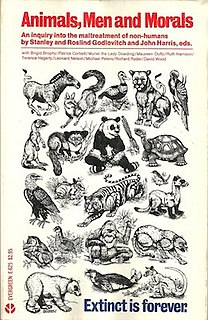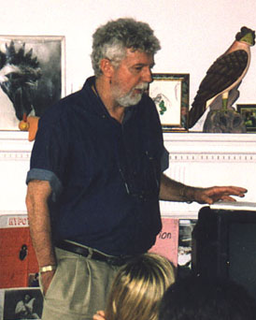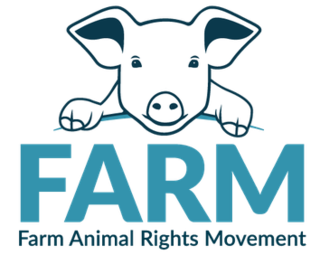Related Research Articles

Speciesism is a term used in philosophy regarding the treatment of individuals of different species. The term has several different definitions within the relevant literature. A common element of most definitions is that speciesism involves treating members of one species as morally more important than members of other species in the context of their similar interests. Some sources specifically define speciesism as discrimination or unjustified treatment based on an individual's species membership, while other sources define it as differential treatment without regard to whether the treatment is justified or not. Richard Ryder, who coined the term, defined it as "a prejudice or attitude of bias in favour of the interests of members of one's own species and against those of members of other species." Speciesism results in the belief that humans have the right to use non-human animals, which scholars say is so pervasive in the modern society. Studies increasingly suggest that people who support animal exploitation also tend to endorse racist, sexist, and other prejudicial views, which furthers the beliefs in human supremacy and group dominance to justify systems of inequality and oppression.
This Index of ethics articles puts articles relevant to well-known ethical debates and decisions in one place - including practical problems long known in philosophy, and the more abstract subjects in law, politics, and some professions and sciences. It lists also those core concepts essential to understanding ethics as applied in various religions, some movements derived from religions, and religions discussed as if they were a theory of ethics making no special claim to divine status.
David Sztybel is a Canadian philosopher specializing in animal ethics.
The animal rights (AR) movement, sometimes called the animal liberation, animal personhood, or animal advocacy movement, is a social movement that seeks an end to the rigid moral and legal distinction drawn between human and non-human animals, an end to the status of animals as property, and an end to their use in the research, food, clothing, and entertainment industries.

Animal rights is the philosophy according to which many or all sentient animals have moral worth that is independent of their utility for humans, and that their most basic interests—such as in avoiding suffering—should be afforded the same consideration as similar interests of human beings. Broadly speaking, and particularly in popular discourse, the term "animal rights" is often used synonymously with "animal protection" or "animal liberation". More narrowly, "animal rights" refers to the idea that many animals have fundamental rights to be treated with respect as individuals—rights to life, liberty, and freedom from torture that may not be overridden by considerations of aggregate welfare.
The argument from marginal cases is a philosophical argument within animal rights theory regarding the moral status of non-human animals. Its proponents hold that if human infants, the senile, the comatose, and the cognitively disabled have direct moral status, non-human animals must have a similar status, since there is no known morally relevant characteristic that those marginal-case humans have that animals lack. "Moral status" may refer to a right not to be killed or made to suffer, or to a general moral requirement to be treated in a certain way.
Animal ethics is a branch of ethics which examines human-animal relationships, the moral consideration of animals and how nonhuman animals ought to be treated. The subject matter includes animal rights, animal welfare, animal law, speciesism, animal cognition, wildlife conservation, wild animal suffering, the moral status of nonhuman animals, the concept of nonhuman personhood, human exceptionalism, the history of animal use, and theories of justice. Several different theoretical approaches have been proposed to examine this field, in accordance with the different theories currently defended in moral and political philosophy. There is no theory which is completely accepted due to the differing understandings of what is meant by the term ethics; however, there are theories that are more widely accepted by society such as animal rights and utilitarianism.
Contemporary debates about animal welfare and animal rights can be traced back to the ancient world. Records from as early as the 6th century before the common era (BCE) include discussions of animal ethics in Jain and Greek texts. The relations between humans and nonnhumans are also discussed in the books of Exodus and Genesis, Judeo-Christian writings from the 6th or 5th century BCE.
Biocentrism, in a political and ecological sense, as well as literally, is an ethical point of view that extends inherent value to all living things. It is an understanding of how the earth works, particularly as it relates to its biosphere or biodiversity. It stands in contrast to anthropocentrism, which centers on the value of humans. The related ecocentrism extends inherent value to the whole of nature.

Animals, Men and Morals: An Inquiry into the Maltreatment of Non-humans (1971) is a collection of essays on animal rights, edited by Oxford philosophers Stanley and Roslind Godlovitch, both from Canada, and John Harris from the UK. The editors were members of the Oxford Group, a group of postgraduate philosophy students and others based at the University of Oxford from 1968, who began raising the idea of animal rights in seminars and campaigning locally against factory farming and otter hunting.
The Oxford Group or Oxford Vegetarians consisted of a group of intellectuals in England in the late 1960s and early 1970s associated with the University of Oxford, who met and corresponded to discuss the emerging concept of animal rights, or animal liberation.
Susan Finsen is an American philosopher, currently professor emeritus of philosophy and former chair of the department at California State University, San Bernardino. She specializes in moral philosophy, with a particular interest in animal rights, as well as philosophy of science and philosophy of biology. She is the co-author, with her husband Lawrence Finsen, of The Animal Rights Movement in America: From Compassion to Respect (1994), and is the director of Californians for the Ethical Treatment of Animals.

Norm Phelps was an American animal rights activist, vegetarian and writer. He was a founding member of the Society of Ethical and Religious Vegetarians (SERV), and a former outreach director of the Fund for Animals. He authored four books on animal rights: The Dominion of Love: Animal Rights According to the Bible (2002), The Great Compassion: Buddhism and Animal Rights (2004), The Longest Struggle: Animal Advocacy from Pythagoras to PETA (2007), and Changing the Game: Animal Liberation in the Twenty-first Century (2015).

Alasdair Cochrane is a British political theorist and ethicist who is currently Professor of Political Theory in the Department of Politics and International Relations at the University of Sheffield. He is known for his work on animal rights from the perspective of political theory, which is the subject of his two books: An Introduction to Animals and Political Theory and Animal Rights Without Liberation. His third book, Sentientist Politics, was published by Oxford University Press in 2018. He is a founding member of the Centre for Animals and Social Justice, a UK-based think tank focused on furthering the social and political status of nonhuman animals. He joined the Department at Sheffield in 2012, having previously been a faculty member at the Centre for the Study of Human Rights, London School of Economics. Cochrane is a Sentientist. Sentientism is a naturalistic worldview that grants moral consideration to all sentient beings.

Animal Rights Without Liberation: Applied Ethics and Human Obligations is a 2012 book by the British political theorist Alasdair Cochrane, in which it is argued that animal rights philosophy can be decoupled from animal liberation philosophy by the adoption of the interest-based rights approach. Cochrane, arguing that there is no reason that (nonhuman) animals should be excluded from justice, adopts Joseph Raz's account of interest rights and extends it to include animals. He argues that sentient animals possess a right not to be made to suffer and a right not to be killed, but not a right to freedom. The book's chapters apply Cochrane's account to a number of interactions between humans and animals; first animal experimentation, then animal agriculture, the genetic engineering of animals, the use of animals in entertainment and sport, the relationship of animals to environmental practices and the use of animals in cultural practices.

Farm Animal Rights Movement (FARM) is an international nonprofit organization working to promote a vegan lifestyle and animal rights through public education and grass roots outreach. It operates ten national and international programs from its headquarters in Bethesda, Maryland.
John Hadley is an Australian philosopher whose research concerns moral and political philosophy, including animal ethics, environmental ethics, and metaethics. He is currently a senior lecturer in philosophy in the School of Humanities and Communication Arts at Western Sydney University. He has previously taught at Charles Sturt University and the University of Sydney, where he studied as an undergraduate and doctoral candidate. In addition to a variety of articles in peer-reviewed journals and edited collections, he is the author of the 2015 monograph Animal Property Rights and the 2019 monograph Animal Neopragmatism. He is also the co-editor, with Elisa Aaltola, of the 2015 collection Animal Ethics and Philosophy.

Sentientist Politics: A Theory of Global Inter-Species Justice is a 2018 book by the English political theorist Alasdair Cochrane, published by Oxford University Press. In the book, Cochrane outlines and defends his political theory of "sentientist cosmopolitan democracy". The approach is sentientist in that it recognises all sentient animals as bearers of rights; cosmopolitan in that it extends cosmopolitan political theory to include animals, rejecting the importance of state borders and endorsing impartiality; and democratic in that it aims to include animals in systems of representative and cosmopolitan democracy. It was the first book to extend cosmopolitan theory to animals, and was a contribution to the "political turn" in animal ethics – animal ethics informed by political philosophy.

The relationship between animal ethics and environmental ethics concerns the differing ethical consideration of individual nonhuman animals—particularly those living in spaces outside of direct human control—and conceptual entities such as species, populations and ecosystems. The intersection of these two fields is a prominent component of vegan discourse.
References
- ↑ Rollin, Bernard E. "Ethics, animal welfare and ACUCs," in John P. Gluck, Tony DiPasquale, F. Barbara Orlans. Applied Ethics in Animal Research. Purdue University Press, 2002, p. 114.
- 1 2 "Lawry Finsen", University of Redlands, accessed 30 May 2012.
- "Lawry Finsen personal page" Archived 2012-03-05 at the Wayback Machine , University of Redlands, accessed 30 May 2012.